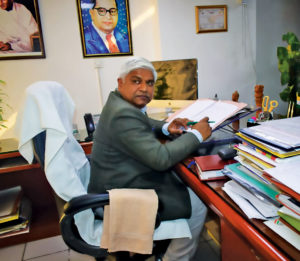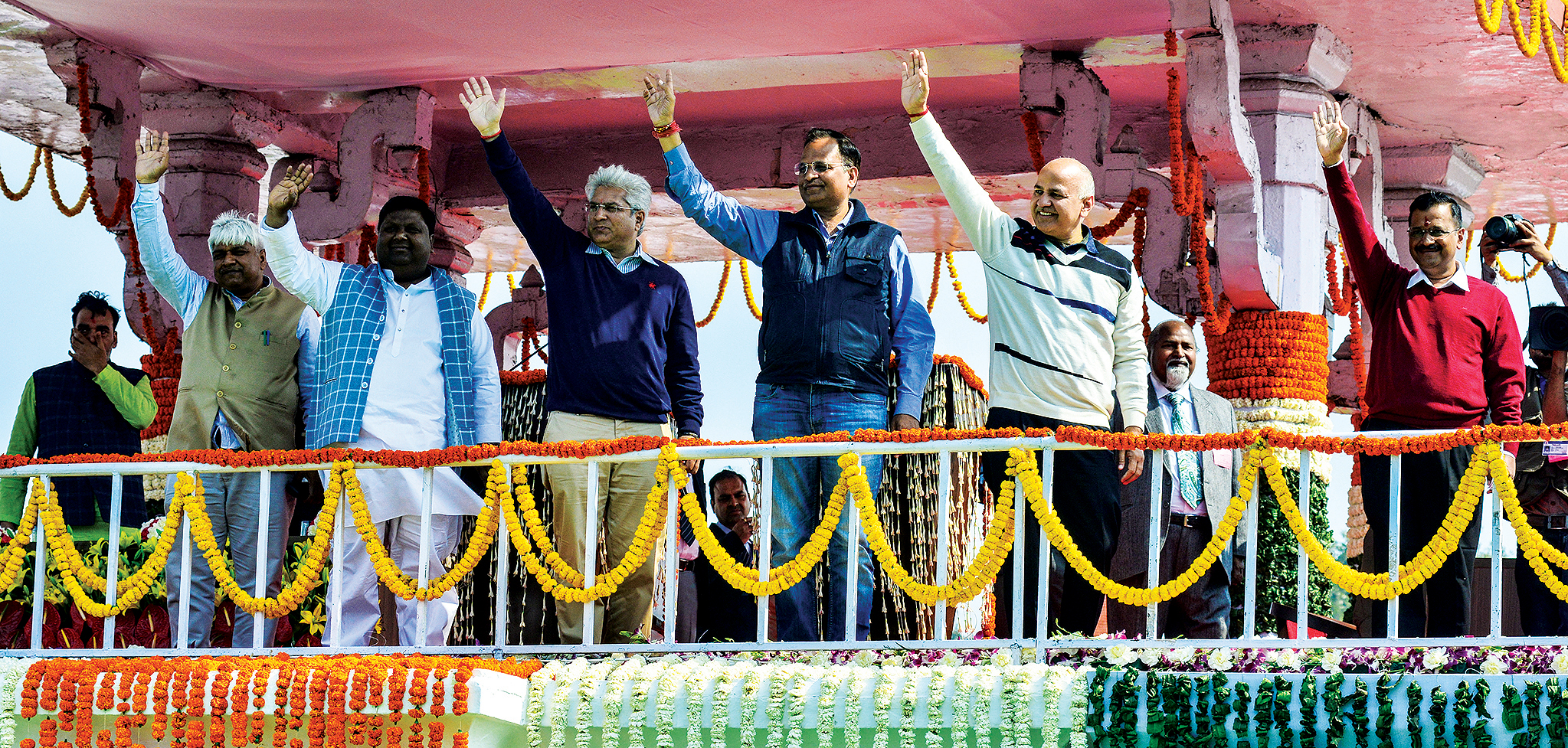Chief Minister Arvind Kejriwal’s six trusted lieutenants are back at the helm of their ministries, being rewarded for good work after the voters gave the party their stamp of approval
The six stalwarts who took oath on February 16, are the same men who had done so in 2015. There was hope that Atishi, someone credited to helping reform the education system of the Capital city, would be given a ministerial post, but that didn’t materialise.
So, while the Cabinet remains an all-male domain like last time, there have been a few changes to the roles assigned. The chief minister will not be taking charge of any department, with the Delhi Jal Board (DJB) assigned to Satyender Jain.
Deputy Chief Minister Manish Sisodia’s extensive profile has one less department with the important Women and Child Affairs going to Rajendra Pal Gautam.
Another critically important department for Delhi is Forest & Environment which will now be under Gopal Rai instead of Kailash Gahlot, who was passed the baton by Imran Hussain in the previous term.
The other responsibilities remain intact under their previous heads. We see what lies ahead for them, a set of promises which will be the judge of their performance in the next five years.
MANISH SISODIA, MLA PATPARGANJ

Net worth: Rs 25.7 lakh approx
Movable assets Rs 4,74,888
Immovable assets Rs 21 lakh
Finance, Education, Tourism, Planning, Land and Building, Vigilance, Services, Art, Culture and Language Departments.
The big one is the education department. In its ‘Report Card’ released before the elections, AAP showed how it was possible to allocate more budget to education over the years. While in its first year into the second term it allocated 7.7% of its budget, by 2019-20 it became 14%.
Along with infrastructural changes to existing schools, it has also built 26 new schools since 2015. It has also given teachers training, reduced the number of vacant positions and created accountability in government schools with attendance marked for the teachers.
In 2019, Delhi government schools had noted that in the Class 12 board exams under Central Board of Secondary Education it had recorded its best-ever performance with a pass percentage of 94.24%.
The AAP government introduced its ‘Happiness Curriculum’ to impart in students a “mindfulness and developing skills of empathy, critical thinking, problem solving, communication and
collaboration to build meaningful
relationships”.
Road Ahead
Going on the lines of the central ruling party’s demand of nationalism, one of AAPs promises is to introduce a ‘Deshbhakti curriculum’ (patriotism). This they say would “inculcate a feeling of nationalism among students”.
Also, in its “guarantee card” released before its manifesto the party has promised to make available “world-class” education facilities to every child.
In its Manifesto, it promises to introduce “Spoken English For Youth”. With skills and personality development classes for students who have completed their schooling from any Delhi school, government or private, in the last five years, to raise their employment opportunities and income potential.
With Tourism under his control, Sisodia will be the person in charge to see through the establishment of 24×7 markets. The manifesto, though, says this would be on a pilot basis in key commercial areas where shops and restaurants can remain open around the clock.
A sizeable population of residents in Delhi are Purvanchalis so perhaps in its quest to keep that voter base intact, the AAP in its Manifesto promised “due recognition for Bhojpuri”. This they say will be done by pursuing “with Central government for Bhojpuri language to be included in the Eighth Schedule to the Constitution of India.” Good luck with that!
SATYENDAR JAIN, MLA SHAKUR BASTI

Net worth: Rs 1.7 crore approx
Moveable assets Rs 26,51,469
Immoveable assets Rs 1.5 crore
Water, Home, Health, Public Works Department, Power, Industries, Urban Development, Irrigation and Flood Control Departments.
Jain had a heavy portfolio already in the second term of the AAP government and with the DJB now under him, he has another big fish to fry. The capital city witnesses water shortage every summer, with some localities still depending on DJP water tankers or even commercial ones. With high demand and a shortage in water supply from its neighbouring states, Jain would have his work cut out for him.
One of the schemes which have been a bit controversial is free water of upto 20,000 litres per household. It has also laid down, in its last tenure, new pipelines in 319 colonies. It’s another matter that not all pipelines are supplying “sweet water” for drinking.
In the report card, the AAP claims that despite water subsidies, DJB revenues have reversed their declining trend to increase at a rate of 9% per annum.
Road ahead:
Under the 10-point guarantee card, six are under Jain’s control. These include ‘Jagmagaati Delhi’ (Shining Delhi), for 24 hours of uninterrupted power supply, free electricity of 200 units which will be continued to be enjoyed and a promise of underground cables to bring electricity to every household.
For his new responsibility, the guarantee guard promises to ensure 24-hour piped water for every household. Also, the 20,000 litres of free water will continue.
Next in the health sector they promise “affordable, accessible, and advanced healthcare facilities” which they will provide through Mohalla Clinics and “state-of-the-art” hospitals. The Delhi government has just a little over 300 Mohalla Clinics, whereas it had promised 1,000 in 2015. Citing problems with land acquisition, it would have to be seen how successful they will be this term.
Jain will also be looking at the unauthorised colonies, providing them basic amenities as promised. This includes providing them with access to “good roads, clean drinking water, sewage system, Mohalla Clinics and CCTV cameras”.
For slum-dwellers, the AAP government wants to provide pucca housing.
He will also have to see to the appointment of Safai Karamcharis, which will fall under the PWD. The Manifesto says that for making Delhi’s streets clean it would employ more Safai Karamcharis taking into account the rapid expansion of Delhi’s residential colonies, according to Census 2011.
It also promises a Rs 1 crore compensation to families of those Safai Karamcharis who “die while performing duty”.
Along with reviving the Yamuna river, they plan on working “together with the Central government to develop a beautiful riverside along the banks of Yamuna”.
Delhi’s roads will be redesigned on these lines starting with a pilot of 40 km of roads within a year.
In the sealing drive at Mayapuri in 2019, the BJP had accused the Delhi government of closing down small industries of the area. This, while the AAP government blamed the BJP-led MCDs of carrying out the sealing drive.
So now, they promise that they will continue to take all legal and administrative measures to put pressure on the Central government, DDA and MCD to not allow sealing of industries/shops and ensure that the sealed shops are opened.
It also promises to “pursue” the Central government to ensure full ownership rights with freehold status for residents of resettlement colonies, and along the same lines promises to put pressure on the Central government to ensure all of Delhi’s unauthorised colonies get regularised and home owners get proper registries for their
houses.
The manifesto further promises legal protection for street vendors in Delhi. This would make it the first state in India to give legal protection to street vendors and hawkers: “We will issue the certificate of vending within six months and set up international quality kiosks to prevent the harassment of street vendors at the hands of MCD and Delhi Police.”
GOPAL RAI, MLA BABARPUR

Net worth: Rs 84 lakh approx
Moveable assets: Rs 23.86 lakh
Immoveable assets: Rs 58 lakh
Forest & Environment, Labour, Employment, Development and General Administration Departments
The big task of cleaning up Delhi’s environment lies with Rai. Each year the quality of air has been deteriorating and the AAP government has been blamed for not doing enough.
While its measures to counter the rising air pollution in the winter months have been measures like the odd-even system for vehicles, their efficacy has been questioned.
Another feather in his cap, the party would like to assume, would be the increase in minimum wages across categories by 43%. Unfortunately, its implementation still seems to be a work in progress. The manifesto, though, does not say a word on this.
Road ahead:
So, what is their solution to pollution? The guarantee card for a pollution- free Delhi says it would work on reducing pollution to a third of current levels. Furthermore, they promise to plant over 2 crore trees for a greener Delhi and also to clean and rejuvenate the Ganga.
Furthermore, it promises to make Delhi garbage and debris-free.
Both the tasks are going to be a major feat to accomplish. If they do, which seems unlikely without the consensus of the Central government and neighbouring states, it would be a winning factor for them.
Heaps of garbage have created mountains of waste in Delhi. Ghazipur landfill is the biggest one, which has risen to 65 metres (213 feet) – just 17 feet short of the Qutub Minar. This dumping yard crossed its maximum capacity 17 years ago, but still the city nor its administration has been able to work out a problem for the man-made mountain emanating toxic gas.
Another promise that will be up to this minister to fulfil is the regularisation of contract employees. It has given an assurance that “all contractual employees employed with Delhi government are made permanent”.
What is also missing, though, is a promise to create jobs.
IMRAN HUSSAIN, MLA BALLIMARAN

Net worth: Rs 1.2 crore approx
Moveable assets: Rs 87.76 lakh
Immoveable assets: Rs 42 lakh
Food and Supply, and the Elections Departments
During an acute price rise of onions, Hussain had asked the Centre to supply adequate quantity of onions to keep the price of the kitchen staple in check. The Delhi government sold the onions through around 250 mobile vans across the city, at a subsidised rate of Rs 23.90 per kg. Onions back then were going for a price of Rs 80 per kg.
Road ahead
Doorstep Delivery of Ration: “We will introduce doorstep delivery of ration as a revolutionary initiative to ensure dignity, transparency and accountability in supply of food ration and ensure food security for all.”
In September of 2018 the Delhi government had started the doorstep delivery facility for 40 public services including issuance and renewal of driving licenses, issuance of ration cards and even birth and death certificates.
The doorstep delivery of food will help many living below poverty line or aged persons. In 2018, three children had died due to starvation in East Delhi’s Mandawali. They had been deprived of their basic right to food, with even the Anganwadi centre having failed to provide the children with food as they had not visited the centre. This facility would mean food reaches people like them.
The government’s aim is also to ensure that only the rightful beneficiaries receive ration.
KAILASH GAHLOT, MLA NAJAFGARH

Net worth: Rs 33 crore approx
Moveable assets: Rs 8.09 crore
Immoveable assets: Rs 25.07 crore
Transport, Revenue, Law and Justice, Legislative Affairs, Information and Technology, and administrative Reforms Departments
The AAP report card states that it managed to add the capacity of bus depot by 2,366 since 2015. Over the years it kept promising more buses but couldn’t fulfil the numbers.
Last year it added 100 buses to its cluster fleet. These vehicles are equipped with CCTV cameras, and panic buttons. More recently, this year it was announced that around 6,000 buses are now plying on the roads of Delhi, which include 806 buses under the cluster scheme.
Also, one other achievement they will count is making bus journey free for women.
Road ahead
The guarantee card promises a public transportation system with over 11,000 buses and over 500 km metro stretch for last-mile connectivity. And like the free bus service to women, this time around it has decided to extend the scheme to include students.
The manifesto dives a little deeper, with the Metro network specifying that it would “connect areas such as Burari, Kirari, Bijwasan, Narela, Karawal Nagar, Mangolpuri and others.”
With Gahlot looking at Law and Justice, he will have a few major cases in his hand.
One, justice for “victims of 1984 anti-Sikh genocide,” an event of history repeatedly brought up by the BJP led central government. AAP says it “will ensure that the findings of the Supreme Court-appointed SIT under Justice SN Dhingra are acted upon promptly and the victims of the 1984 An- Sikh genocide get justice.
The AAPs other promise is a “pro-farmer land reforms”. The Manifesto claims that it will “pursue with Central government to amend Sections 33 and 81 of the Delhi Land Reform Act to remove the unjust restrictions on farmers’ rights on their land and so that they can use it as per their wishes.”
While the AAP mentions the Jan Lokpal Bill in its Manifesto, it doesn’t make any assurances to pass it, as it claims the ball remains with the Centre. Instead it will “continue its struggle to get the Delhi Jan Lokpal Bill passed by the Central government.”
RAJENDRA PAL GAUTAM, MLA SEEMAPURI

Net worth: Rs 89 lakh approx
Moveable assets: Rs 23.49 lakh
Immovable assets: Rs 66 lakh
Women and Child Affairs, Social welfare, SC and ST, Cooperative and Gurudwara Elections Departments
In its report card, the AAP says it revived the Delhi Commission for Women, making it an “active champion for women’s rights and safety, which can be seen in the increasing number of cases dealt by the commission”. To back this, it shows number of cases dealt with from 2007 to 2015 which was 20,000. Whereas from 2015-2018 the commission saw 52,473 cases.
The report also says that 20 Mahila Panchayat women members are trained in legal issues, dispute redressal mechanism, laws relevant to crimes against women, given exposure about the existing legal position regarding property, maintenance, marriage, custody, etc
Road ahead:
In order to see Delhi become a safer city for women, the AAP plans on introducing Mohalla Marshals who will be appointed for enhanced security, in addition to CCTV cameras, streetlights and bus marshals.
The manifesto also promises to enhance the participation of women in the economy. It said, “We will undertake initiative to connect housewives with job and business opportunities from or near their homes so that they can contribute to their household income as well as to Delhi’s and nation’s economic development. Women shall be provided access to cheap capital and requisite skills.
“The current requirement of having an address proof of Delhi from or before 1993 for being eligible for an OBC certificate is retrograde. We will pursue the Central government to replace this with the requirement of an address proof in Delhi for the past five years.





